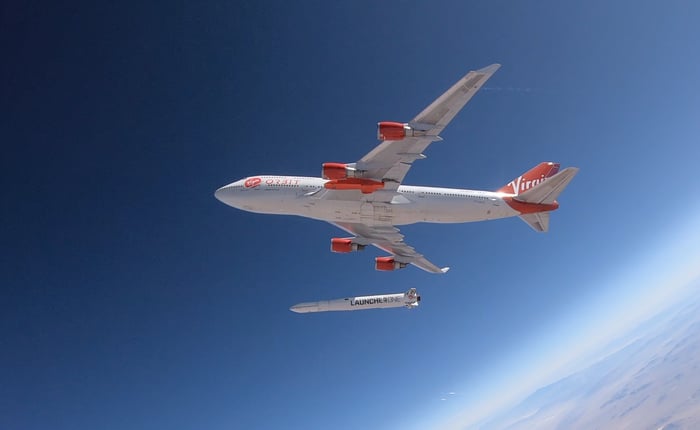Like a WWII-era Grumman Avenger, the plane ripped through the air. At its designated drop point, it deployed its payload, a torpedo-shaped rocket ... and there's where the comparison ended.
For the plane in question wasn't a small, propeller-driven torpedo bomber but rather a hulking, modified Boeing 747 named "Cosmic Girl." And it wasn't a torpedo the plane dropped with the aim of sinking an enemy battleship -- but an inert twin of the "LauncherOne" rockets that will one day soon launch satellites into orbit.

Image source: Virgin Orbit.
Virgin passes its test
Virgin Orbit was the company that ran this test flight earlier this month. It's the two-year-old sister company to Sir Richard Branson's Virgin Galactic company that will soon become the world's first pure-play publicly traded "space stock."
As Virgin Orbit explained, last week's test flight marked "the last major step... in the run-up to its first space shot" at launching a rocket into orbit from an airplane in mid-air. Now that Virgin Orbit has confirmed that its rocket-release mechanism works "cleanly" and tested how LauncherOne will free fall in "the few critical seconds just after release" before ignition, the company is one step closer to repeating its feat using an operational LauncherOne rocket -- and seeing if it can hit the speeds necessary to not just reach space, but actually stay there in orbit around the Earth.
When will Virgin launch?
When will that first operational test flight take place? Virgin Orbit won't say, exactly. There are still "a rigorous series of checks and rehearsals leading up [to LauncherOne's] first launches to space later this year," according to the company.
On the other hand, Virgin did say "later this year." And it did say "launches" -- plural.
This suggests that, assuming Virgin follows standard operating procedure for new space companies -- which means conducting one completely successful test and then shifting immediately into commercial operations -- Virgin Orbit could test fire its rocket within the next few months. If all goes well, Virgin might even put its first paying customer(s) in orbit before the year is out.
What does it mean for investors?
Incidentally, Virgin already has that first customer lined up -- satellite communications company OneWeb. And while Virgin is now embroiled in incredibly inconvenient litigation with OneWeb over canceled launch contracts futher down the road, it appears that at least the first four launches for its customer are still on track.
This could pose a problem for investors in Northrop Grumman (NOC -0.02%), however. With the recent bankruptcy of Stratolaunch, Northrop Grumman is now the only other company in the world routinely launching satellites into orbit utilizing rockets deployed from airplanes in flight.
Admittedly, as recently as 2016, I thought this niche area of the space-launch market looked safe for the Northrop division then known as Orbital ATK. But Virgin Orbit has advanced by leaps and bounds and now looks well-placed to challenge Northrop in this market -- and perhaps even win it away.
The last time we checked, Northrop was charging about $55 million to launch payloads of under half-a-ton from midair aboard its Pegasus rocket -- like LauncherOne, deployed from a modified cargo aircraft, but in Northrop's case, a Lockheed L-1011 dubbed "Stargazer." Virgin, however, has been advertising launch costs as low as $10 million for similar-sized payloads. And its contract with OneWeb specified a volume-discounted rate of just $6 million per launch, spread across a series of 39 separate launches.
Thus, the problem for Northrop Grumman is that, not only does it face competition in a space-launch niche it once dominated but also faces competition from a rival able to undercut its prices -- by nearly a factor of 10!
Admittedly, this is only a tiny threat for Northrop. The few dozen times it has launched Pegasus over the last 20 years or so probably added up to barely $1 billion in revenues -- total. Today, Pegasus represents only a minuscule fraction of the $31.5 billion in revenue Northrop rakes in annually, according to S&P Global Market Intelligence figures.
That being said, if "every little bit helps," it stands to reason that even the loss of even this "little bit" is going to hurt Northrop Grumman.





